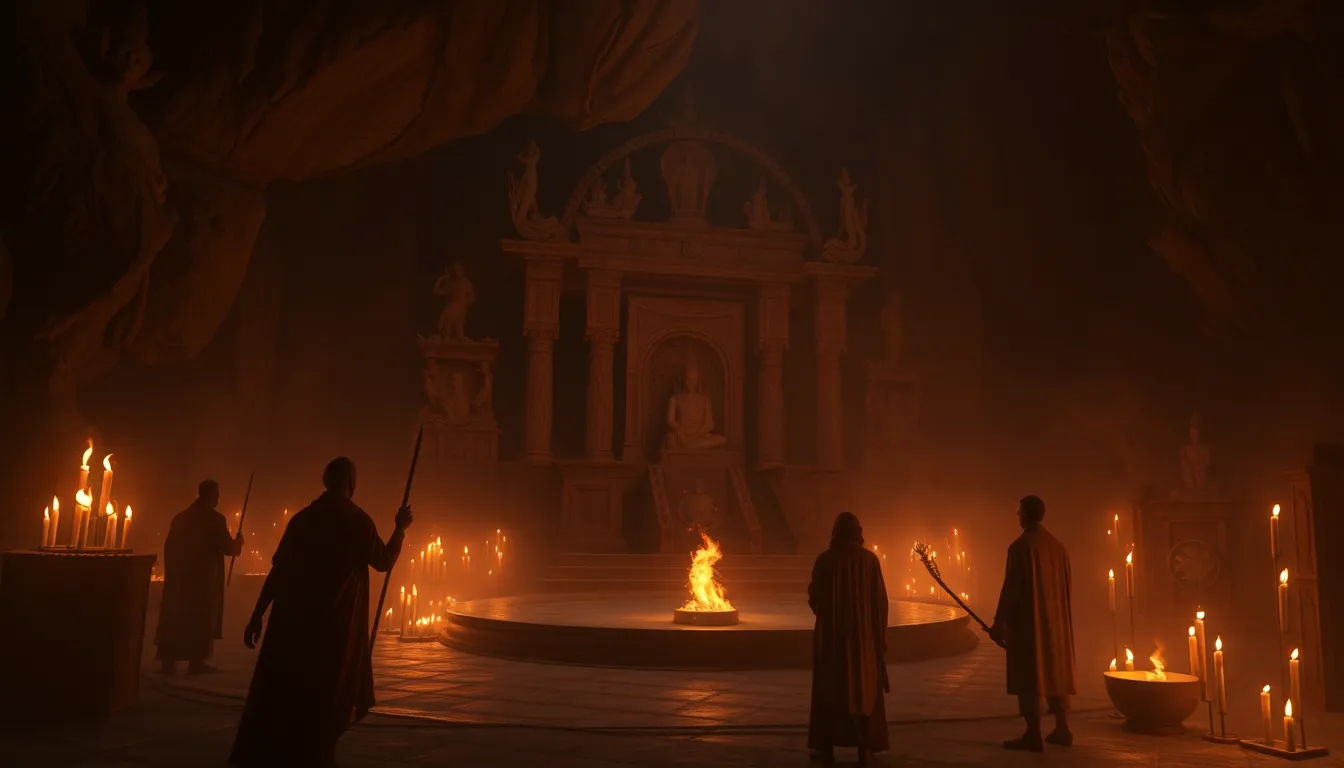The Sacred Rituals: Celebrations in Mythical Places
Introduction to Sacred Rituals
Sacred rituals are ceremonial acts that are imbued with spiritual significance and are often performed to honor deities, celebrate life events, or mark seasonal changes. These rituals play a crucial role in connecting individuals and communities to their cultural heritage and beliefs. In many cultures, mythical places serve as the backdrop for these sacred rites, offering a sense of connection to the divine and the ancient narratives that shape a society’s worldview.
Mythical places, whether they exist in the realm of legend or are rooted in historical significance, provide a rich tapestry of cultural relevance. They are often seen as intersections between the earthly and the divine, where human experiences are intertwined with the stories of gods, heroes, and creation itself.
The Role of Mythical Places in Cultural Narratives
Throughout history, mythical places have shaped the cultural narratives of civilizations, influencing beliefs, values, and practices. These locations often embody the essence of a culture’s mythology, acting as sites of power, transformation, and reverence.
Some notable examples of mythical locations include:
- Atlantis: A legendary island known for its advanced civilization, often associated with themes of utopia and lost wisdom.
- Avalon: A mystical island in Arthurian legend, believed to be the resting place of King Arthur and a symbol of magic and healing.
- Shangri-La: A fictional paradise described in James Hilton’s novel, representing an idealized, harmonious society untouched by modernity.
Rituals of Creation: Celebrating Origins in Mythical Landscapes
Many cultures have creation myths that are deeply tied to specific geographical locations, often celebrating the origins of the earth and humanity. These myths frequently depict the relationship between the divine and the natural world, highlighting the sacredness of particular landscapes.
Two notable case studies include:
- The Garden of Eden: In Judeo-Christian tradition, this is the paradise where the first humans, Adam and Eve, lived. The garden symbolizes innocence and the divine connection to nature.
- Mount Olympus: In Greek mythology, it serves as the home of the gods. Rituals honoring the deities of Olympus often took place in its shadow, signifying the importance of divine presence in the natural world.
Seasons of Celebration: Festivals Tied to Mythical Events
Seasonal festivals often draw inspiration from mythical stories, marking significant moments in the natural cycle. These celebrations are not only a reflection of agricultural practices but also serve to reinforce cultural narratives and community bonds.
Examples of such festivals include:
- The Winter Solstice: Celebrated in many cultures as a time of rebirth and renewal, often linked to solar deities and the return of light.
- Beltane: A Celtic festival marking the beginning of summer, where rituals celebrate fertility and the blossoming of life, often invoking the presence of the Earth Mother.
Rituals of Transformation: Coming-of-Age Ceremonies in Mythical Contexts
Rites of passage are significant in many cultures, marking the transition from childhood to adulthood. Mythical places often serve as the setting for these transformative experiences, providing a sacred space for individuals to undergo personal growth.
For example, in Greek mythology, the Underworld is often depicted as a realm of transformation, where souls undergo trials and tribulations before rebirth or ascension. Such narratives reinforce the idea that transformation is a journey, often fraught with challenges, leading to enlightenment and maturity.
Divine Communication: Rituals to Connect with Deities
Many cultures developed rituals aimed at appeasing or communicating with gods, seeking their favor or guidance. These rituals often take place in mythical locations believed to be close to the divine.
Notable examples of such rituals include:
- The Eleusinian Mysteries: Ancient Greek rites held in honor of Demeter and Persephone, focusing on themes of life, death, and rebirth.
- Rituals at Delphi: The Oracle of Delphi was a sacred site where individuals sought prophetic guidance from the Pythia, the priestess of Apollo.
The Influence of Mythical Geography on Ritual Practices
The physical characteristics of mythical places significantly shape ritual practices. The environment can dictate the materials used, the types of offerings made, and even the timing of ceremonies.
For instance:
- Mountainous settings: Often associated with ascension and enlightenment, rituals performed in high places may focus on spiritual elevation and communion with the divine.
- Aquatic settings: Water bodies are frequently tied to themes of purification and renewal, with rituals involving offerings or immersions as methods of seeking blessings.
Modern Interpretations: Reviving Sacred Rituals in Contemporary Culture
In contemporary society, many ancient rituals are reinterpreted and adapted to fit modern contexts. This revival is often seen in festivals that celebrate mythology and cultural heritage.
Examples of modern celebrations include:
- Burning Man: An annual festival in the Nevada desert that emphasizes self-expression, community, and art, often echoing themes from various mythologies.
- Litha: A modern pagan celebration of the summer solstice, reflecting ancient traditions of honoring the sun and the earth.
The Power of Storytelling in Rituals: Myths Passed Through Generations
Storytelling plays a pivotal role in preserving rituals associated with mythical places. Oral traditions have allowed these narratives to be passed down through generations, adapting to cultural shifts while retaining their core significance.
The importance of storytelling includes:
- Preserving cultural identity and continuity.
- Educating younger generations about their heritage and values.
- Inspiring creativity and fostering community bonds through shared narratives.
Conclusion: The Enduring Legacy of Sacred Rituals in Mythical Places
As we reflect on the significance of sacred rituals in mythical places, it becomes clear that these practices remain vital in today’s society. They connect us to our past, enrich our present, and inspire future generations to appreciate the cultural celebrations rooted in myth.
In an increasingly globalized world, it is essential to honor and participate in these rituals, recognizing their role in fostering unity, understanding, and respect for diverse cultural legacies. Embracing these ancient traditions can lead to a deeper appreciation of our shared humanity and the stories that bind us together.



